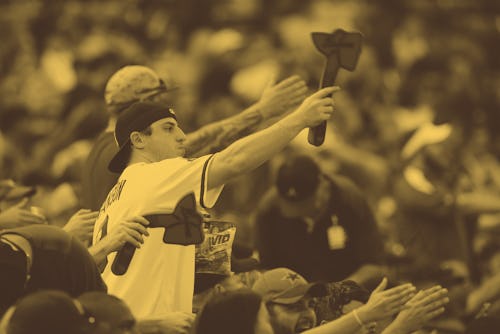The Atlanta Braves' racist tomahawk chop is here to stay, according to the MLB commissioner
The team whose mascot was once "Chief Noc-a-Homa" has done a "phenomenal job with the Native American community," the commissioner said.

America’s pastime is once again showing it’s still stuck in the past. Before Game 1 of the 2021 World Series matchup between the Atlanta Braves and Houston Astros, MLB commissioner Robert Manfred proclaimed the controversy over the Braves’ offensive use of Native American culture is no longer a matter of concern for him — and he cites reasons that are suspiciously incomplete.
Manfred’s reasoning for ending discussions on changing the Braves’ nickname and tomahawk chop is rooted in business marketability and revisionism. The MLB commissioner says the Atlanta Braves have done a "phenomenal job with the Native American community," with years of supportive work in the region. He even went as far as to claim the Native American community in Atlanta “is wholly supportive of the Braves program, including the chop.” He didn’t specify what the Braves have done with the Native American community, nor why he believes an entire community of Native Americans supports a questionable misappropriation of their culture. But he did give more believable, and disappointing, reasoning when he provided a business explanation for a cultural problem.
For Manfred, the MLB as an organization is only concerned with each of the 30 markets it has a team in. If Native Americans in Nevada have an issue with a symbol of their history being used as the logo of a baseball team, tough luck because “each market is different.” Manfred and the MLB are giving individual teams autonomy in decisions that will reverberate throughout America in the name of marketability. Even if those teams don’t market all 162 regular-season games nationally like the NFL and the NBA, they’re still national brands whose local affairs affect their legions of fans across America. It appears the MLB is so unwilling to adjust one of its most iconic logos and popular chants that it's willing to bend the truth to fit its agenda.
The idea any community of people could be wholly in agreement about anything is faulty, delusional reasoning, especially when you take into account the Braves’ sordid history with Native American communities. Two years ago, Cherokee and Creek tribal chiefs in Georgia denounced the tomahawk chop as an inappropriate depiction of Native Americans. Manfred’s stating “way before this became an issue, Atlanta cultivated a relationship with the Native American community,” is disrespectfully narrow-minded considering the fact Native Americans in Atlanta protested the Braves’ misuse of their culture in 1993, as well as in 1991 and 1992. Braves fans were dressing as Indians while actual Native Americans were yelling “Stop the chop,” and the owners of the Braves still found no reason to change their name or stop the chop.
To the Braves’ credit, they have made recent attempts to give a greater appreciation of the Native American community and its history. In 2020, the Braves recognized the Eastern Band of Cherokee Indians (EBCI) Principal Chief Richard Sneed’s contribution to armed forces on Veterans’ Day, erected a “We Are Still Here” exhibit in its stadium Truist Park meant to educate fans on the Cherokee culture and customs, and had Sneed exchange jerseys with Braves legend Hank Aaron on Opening Day. The following year, the Braves held its first-ever EBCI Night that included a performance from Cherokee dance group Raven Rock Dancers, Sneed throwing the first pitch, the inclusion of the Cherokee language of Syllabary in the in-game highlights, and a pre-game presentation of the Braves’ “We’re Still Here” video about the ECBI’s cultural impact. That’s all well and good, but it was all non-existent when Native Americans were protesting in the Atlanta streets. Plus, the team’s acknowledgment of parts of Native American culture and changes to its name and fan gestures don’t need to be mutually exclusive.
With the Cleveland Indians not only planning to change its name to the Cleveland Guardians after this season but also the Indian imagery which iconified the team, there is no excuse for the Atlanta Braves' intransigence or the MLB’s impartiality. If the MLB wants to improve its declining popularity and cultural relevance, maybe it should spend less time testing out robot umpires and instead push teams to get with the times or get out of the league.